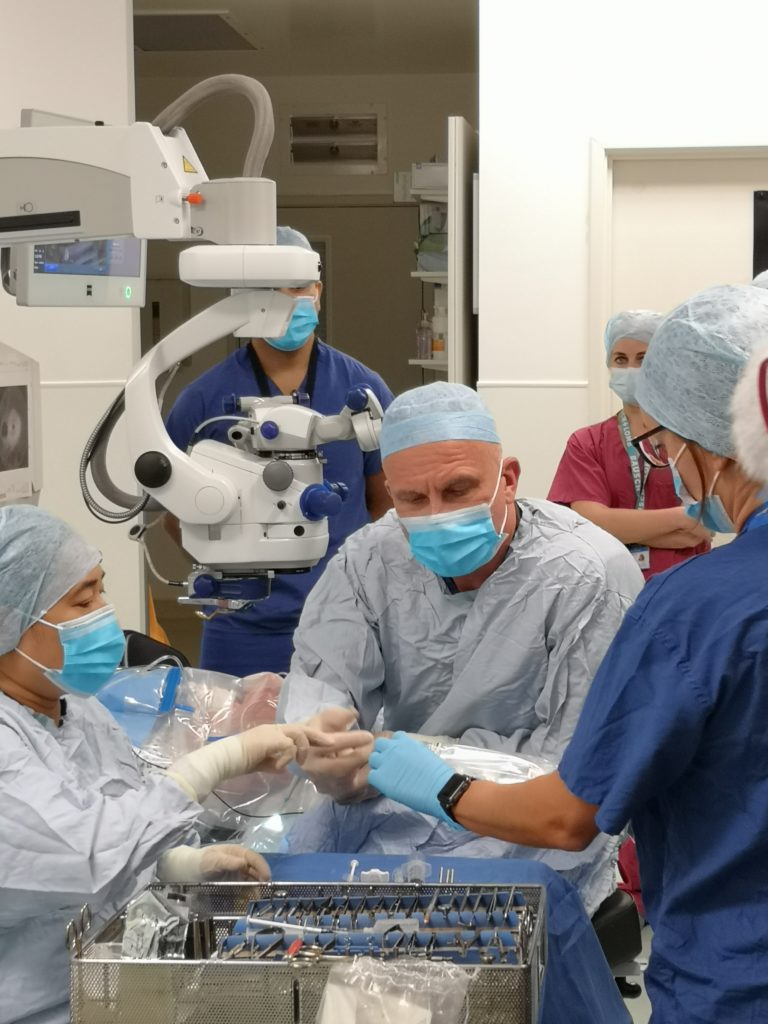Gene therapies modify the genes of our cells to repair defects in our genetic material. The science of gene and cell engineering promises new treatments that may help people with many different diseases, across all fields of medicine, that result from defective genes.
Oxford has an established track record in creating new technologies in areas like genetics, editing of DNA and RNA and immune cell biology. This has often led to brand new therapies tested in human beings for the first time in clinical trials. Examples include treatments for cystic fibrosis and diseases of the retina.
We are using Oxford’s strength in experimental medicine to improve these technologies and carry out further research in medical settings. We hope that this will ultimately lead to new treatments available in the NHS.

Eye therapies
A group of researchers in Oxford are working on cures for blindness.
Led by Professor Robert MacLaren, we have already made progress in developing prospective treatments for the most common causes of vision loss. These are age-related macular degeneration (AMD), the most common cause of visual loss in older people, and retinitis pigmentosa (RP), the most common cause of visual loss in younger people in the UK.
This work includes:
- development of a single gene therapy treatment for AMD
- the transplantation of photoreceptor cells derived from stem cells to treat RP
Read more about our eye therapy research
T cell therapies
Another significant area of our work in this theme relates to the modification or editing of T cells, white blood cells that play an important role in the body’s immune response.
Teams led by Professors Ronjon Chakraverty and Paresh Vyas are working to produce modified T cells that can act as an ‘off the shelf’ therapy for several blood cancers.
We have identified a genetic variant that protects against several autoimmune diseases, including multiple sclerosis. We are researching how we can edit the gene to include this protective variant in blood stem cells and transplant it into MS patients.
Read more about our work on T cells
Professor Charkraverty also leads a new Precision Cellular Therapeutics NIHR Blood and Transplant Research Unit which aims to develop new kinds of cell therapies for blood disorders and blood cancer, and improved systems for following up patients receiving treatment.
Gene editing
Several Oxford groups are designing technologies based on very precise CRISPR gene editing that are carried out in living tissue – not in the patients themselves, but in organoids – organ-like entities developed from cells taken from patients. This is an important step in validating the effectiveness of this gene editing approach.
Professor Matthew Wood has developed a method of modifying RNA that can be applied to a number of diseases, while Professor Deborah Gill is using gene editing to treat new-born respiratory distress syndrome. Professor MacLaren is also leading a research programme to develop gene editing tools to treat retinal degeneration.
Researchers in this theme have launched the UK’s first pilot study to conduct routine testing of new-born babies for spinal muscular atrophy (SMA), led by Professor Laurent Servais. We are carrying out an economic analysis of the impact this therapy which will inform the cost-effectiveness of such early genetic treatments for infants with rare diseases.